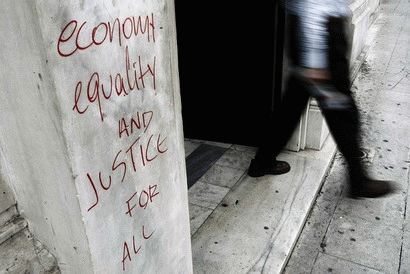Two days ago Greece suffered its second debt-rating blow in a week, when Standard & Poor's downgraded two top banks and warned that the Greek economy was actually in worse shape than it had predicted. Last week, Fitch Ratings lowered its rating on Greece thus raising fears of a potential default. On Monday the Greek government started a 'counter-attack' against the negative perspective of the country's economic situation. In a televised address Prime Minister George Papandreou outlined sweeping changes to increase competitiveness and combat corruption and tax evasion.
"Economy, Equality and Justice for All". A slogan written on a bank branch entrance in Athens December 14, 2009. Greek Premier George Papandreou will outline economic policies late on Monday, aiming to reassure markets and EU partners demanding specific ways to cut deficits threatening to sink the euro zone's weakest member. (Reuters)
Athens has come under strong pressure these days from the European Central Bank and the bureaucratic leadership of Brussels to adopt radical measures to rebuild its economy after the recent downgrades. Indirectly, but clearly, the EU asks from the newly-elected Greek government to send the bill to the middle and lower classes; to exercise a strict economic policy of austerity, reduce social spending and freeze salaries for at least four years.
The major problem is that Europe's economic leadership, as well as these uncontrollable rating agencies, pretend to ignore the actual reasons which brought Greece and possibly other countries in the near future on the edge of fiscal precipice. It shouldn't surprise anybody. The appeal to public debt and deficit is a known tactic of neoliberalism, especially in times of financial disorder.
The advocates of uncontrollable, devouring, Capitalism, try to suppress the fact that among the major factors for public deficits burgeoning, is the continuous feeding of Capital's tremendous profits - benefits through scandalous tax exemptions and various sponsorships as a result of the existing corruption between the State and the capitalist private sector. Its characteristic that the Greek State loses around 1.2 billion Euros as a result of tax exemptions on ship-owning companies, while between 2005 and 2009 the profits of the country's 300 largest Cos. and banks were increased by almost 365%. "Some 300 companies and banks in the last five years benefited from a reduction in tax rates," Finance Minister George Papaconstantinou had said last November.
Furthermore, the Greek State loses around 2 billion Euros every year from the tax evasion of employers who promote uninsured labor, thus contributing to the devitalization of the pension system. This amount is infinitely small related to the profiteering of Greece's creditors mainly foreign or local banks. It should be noted that from the annual budget of 2009, almost 42 billion Euros had been withheld for this purpose. As a result of this social spending has been significantly reduced, in favour of those who benefit from the high rates of Greek government bonds.
An obvious question comes to my mind: Doesn't the European Union carry any responsibilities for this situation? Nobody can deny that national governments, including Greece's, committed significant mistakes in their economic policies. But, on the other hand, the bureaucratic, pro-capitalist, elites in Brussels, Frankfurt or London cannot behave like Pontius Pilate. Furthermore, they were the captains of Europe's route to economic neoliberalism during the last decade a route which brought the EU in today's crisis. The so-called Stability and Growth Pact (SGP) is in danger due to the financial circumstances while there is a need for a generous institutional reform of the Eurozone. Because, unfortunately, the recent economic crisis exposed the Union's actual impotence to foresee and, moreover, face such negative economic situations.
The victims of national debt throughout the years aren't few. From Yugoslavia (1991) to Ukraine (1994) and from Indonesia to Zimbabwe, the onerous conditions set by their foreign creditors led to strict austerity, tax increases, rapid salaries decreases and job cuts thus destroying their economies. Greece, or any other EU member-state, is not going to be their next victim.
The 'Priesthood' of rating agencies
Standard & Poor's, Fitch and Moodys are regarded as the three major rating agencies which provide opinions to investors on the ability and willingness of issuers to make timely payments on debt instruments. According to an official testimony by U.S. Senator Paul. S. Sarbanes, who since 2002 had publicly noted their controversial function, credit rating agencies play a very important role in the capital markets, thus having crucial impact on world economic structure (03-07-2006). On November 2004, the Washington Post wrote that "from their Manhattan offices, they can, with the stroke of a pen, effectively add or subtract millions from a company's bottom line, rattle a city budget, shock the stock and bond markets and reroute international investment". It's characteristic that until the day of their collapse, banking giants like AIG and Lehman Brothers were given very positive investment-grade ratings from the above agencies.
The article was quite revealing: "Without their ratings, in many cases, factories can't expand, schools can't get built, highways can't be paved. Yet there is no formal structure for overseeing the credit raters, no one designated to take complaints about them, and no regulations about employee qualifications. The big three ostensibly function as a disinterested priesthood. When a company, town or entire nation wants to borrow money by selling bonds, the market almost always requires that the rating companies bless the move by running a kind of credit check. Bonds they deem safe get a good rating. The higher the rating, the lower the interest rate the borrower must pay"





